Looper


Okay, before I delve into this movie
I have a confession to make: I’m biased as all hell when it comes to the
works of Rian Johnson. His debut film ‘Brick’ - a hyper-kinetic
stylisation of film noir tropes transplanted into a high school setting
- remains one of my favourite movies of all time and he also directed
one of the most visually unique episodes of the superb Breaking Bad,
‘Fly’. I followed Looper’s progress through the various
stages of production from the moment it was announced and waited with
bated breath for its eventual release. So, obviously this little film
has some big shoes to fill in my eyes; was I as enraptured by this as I
was with Johnson’s previous body of work or is this the point where the
first cracks appear in his seemingly impenetrable oeuvre?
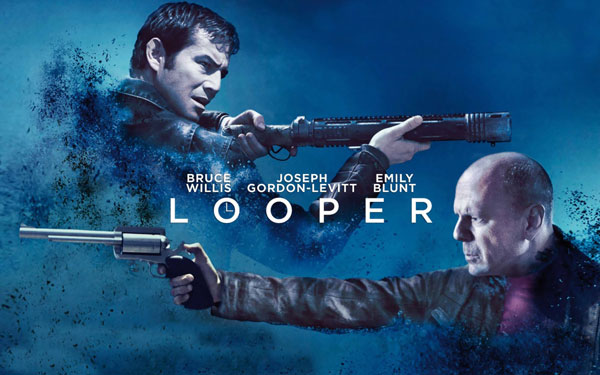
In the year 2074 time travel has been
invented and subsequently immediately illegalised, leaving the only
people with access to this technology those who choose to operate
outside of the law. Using time travel as a way of disposing unwanted
competition, criminals send their target back thirty years to 2044 where
an assassin known as a “Looper” awaits to punch their clock and dispose
of the body in an era where the deceased doesn’t yet exist. Seemingly
it’s the perfect system and the Loopers are financially well compensated
for their work.
However there is one major catch: At
some point their future selves will be sent back and it’s the Looper’s
job to effectively kill themself. Targets are sent back handcuffed, with
bags over their faces and a payment of silver bars strapped to their
back, so it’s impossible to know who you’re killing until after the deed
is done. If the body has gold bars, however, then the Looper knows that
their time is up and they have thirty years left to enjoy the spoils of
their work.
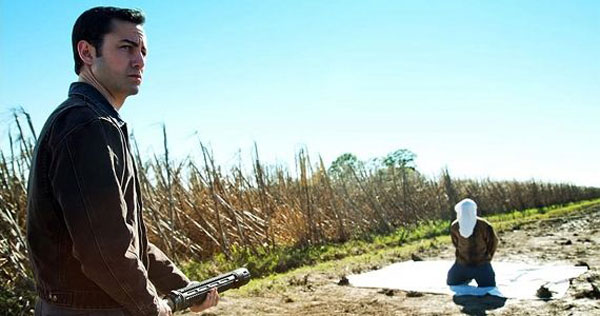
Joseph Gordon-Levitt plays Joe, a
highly efficient Looper who seemingly has little concern regarding his
future – He knows the conditions that come with the job and the wealthy
lifestyle it affords more than compensates for the fact that he’ll
eventually murder himself.
Everything is thrown into turmoil
when a fellow Looper accidently allows his future self to escape; Joe
reluctantly gives his friend up to his boss Abe (Jeff Daniels) and sees
first-hand the ramifications of not “closing the loop”. Hearing
whispers of a future criminal named “The Rainmaker” who is going around
and closing all the loops prematurely, Joe suddenly finds himself on the
other end of the gun when his own future-self (Bruce Willis) escapes
death and goes on the run, determined to locate the child in the present
who will eventually become “The Rainmaker” and eradicate him, averting
future events.
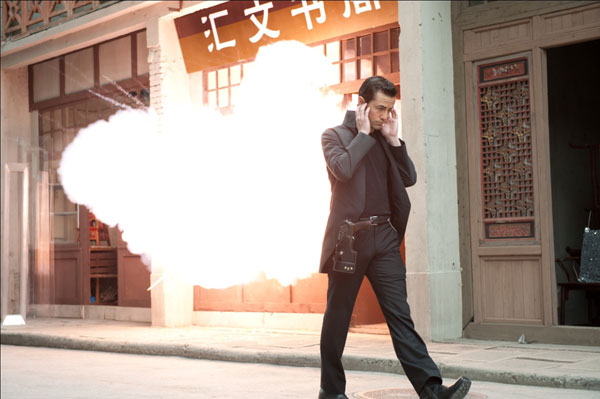
Looper is that rare beast of a film that appeals to both fans of graphic
violence and intelligent design, proving that the two aren’t mutually
exclusive. Johnson’s direction is as engaging as ever, with the heavy
plot exposition necessary to immerse the viewer into the world of
Looper guided with a deft hand. The setting of the film isn’t your
typical dystopian future; in fact, aside from a few futuristic vehicles
and items, the world is instantly familiar, eschewing the alienating
bombast of many films from this genre.
The violence is confronting at times but serves as an extension of the
plot rather than the story accommodating it purely for the sake of
appealing to action fans. The plot itself, whilst seemingly
straightforward, consistently subverts your expectations; all of a
sudden the protagonist you’re rooting for will become the antagonist and
the entire tone of the film shifts.
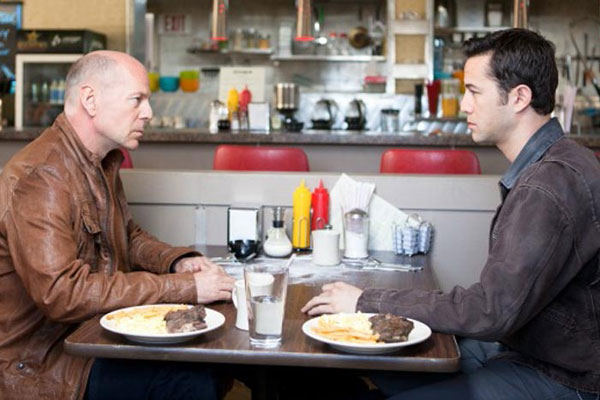
Ignoring the obvious prosthetic enhancements to make Gordon-Levitt more
closely resemble a young Bruce Willis, particular commendation must go
to Gordon-Levitt for the subtle nuances and physical mannerisms that
enhance his portrayal; not for one second was I not convinced that they
were the same person, at least in a physical sense. Bruce Willis pulls
out a performance unrivalled by his recent output, reminding us all that
not only is he a great action hero, he can also actually act. Superb
supporting turns from Emily Blunt, Jeff Daniels and Noah Segan serve to
further immerse you into the world of Looper.
Despite the convoluted storyline, Writer/Director Rian Johnson has an
engaging directing style that makes the audience feel the story
rather than being merely outside observers, making each fresh
development easy to digest. Most importantly, he never bludgeons you
over the head with symbolism or detached actions scenes – Each and every
single shot in Looper serves a purpose.
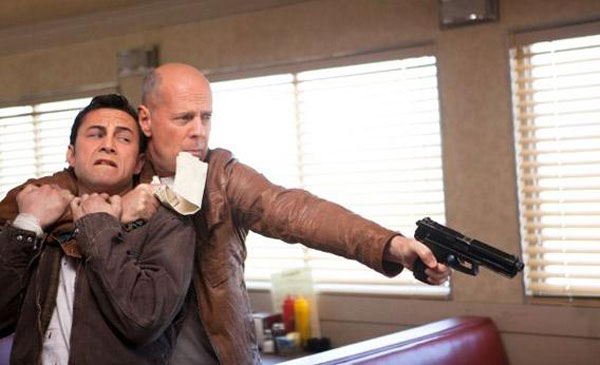
Audio/ Visual
Looper's
image quality is up there with the very best. Colours are balanced
impeccably, aside from some slightly washed out blacks, and facial
textures and other minute details are as clear as you’d expect. There is
no evidence of strobing or the presence of visual artefacts and the
detail present in the skin textures of the actors has to be seen to be
believed. Aesthetically Looper shifts from a neon lit noir
setting to a vividly realised countryside and the transfer competently
handles everything this visually arresting film throws at it.
Looper’s
DTS-HD 5.1 lossless soundtrack handles the sonic acrobatics of the film
convincingly; music and dialogue feel natural and balanced and
incidental effects, such as the hum of a hover bike, dance from one
speaker to the next in a stunning display of sound engineering. There’s
no audible bleed through between channels and the soundtrack is as
robust as intended. Put simply this is the finest transfer I’ve
encountered this year.
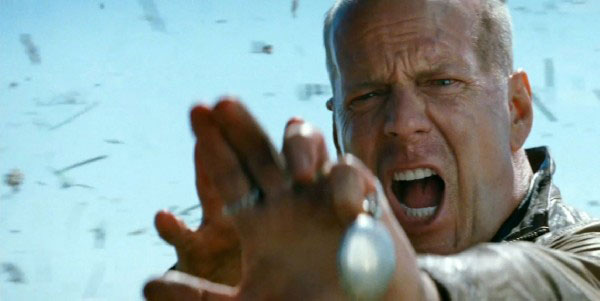
Special Features
At first glance it appears that Looper has a vast collection of
special features, but considering that the featurettes generally run
around five minutes long and repeat interview footage, you will burn
through them pretty quickly. The collection of featurettes that comprise
‘The Making Of Looper’ are, aside from their brief running time,
slightly disappointing in that they amount to nothing more than the
usual puff pieces that studios churn out and don’t really delve that
deeply into the production process, with the exception of an interesting
look at the science behind time travel .
Thankfully to counterbalance this Looper also has over half an
hour of of deleted scenes with optional commentary plus a feature
commentary with Director Rian Johnson which serves to cover every minute
detail associated with the film.
List of features:
-
Feature Commentary (With Rian Johnson, Joseph Gordon-Levitt and Emily
Blunt)
-
Animated Trailer
-
The
Two Joes
-
Deleted Scenes (With Optional Commentary from Rian Johnson and Noah
Segan)
-
The
making of Looper: The Future From The Beginning
-
The
Science Of Time Travel
-
New
Future, Old School
-
The
Scoring Of Looper

Final Thought
It would have been all too easy,
especially with such an inventive story device serving as a frame, for
Johnson to play the latter part of the film out as an archetypical
series of shoot outs and chase scenes until the inevitable
confrontation. Instead he uses the twisting storyline to raise
interesting questions; not only pertaining to the paradoxes inherent in
time travel but also moral and philosophical ones that further feed the
rich mythology of the film and leave a lasting impression long after the
credits roll.
Looper,
like ‘Moon’ before it, is a fresh and invigorating take on an old
Science Fiction trope and manages to craft a story that is captivating,
unique and, most importantly, absolutely terrific. It may not exactly be
the film that you expected to see going in, but it’s all the more better
for its subversion of expectations.
Highly recommended.